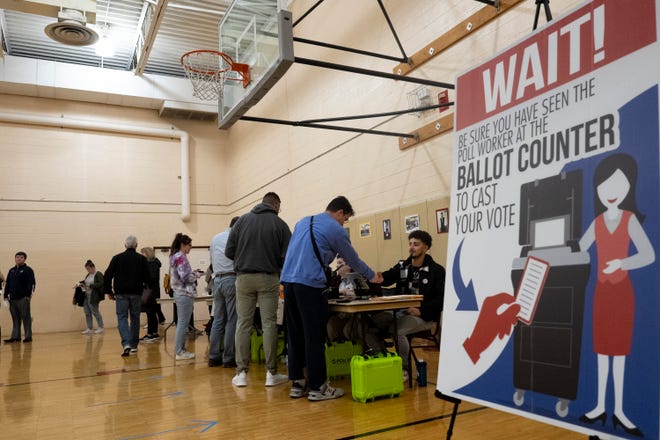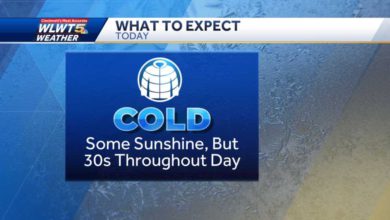

- Ohioans will have to show photo ID to vote on Election Day
- Voters can no longer use utility bills, other documents to vote
- Mail-in ballots must arrive within 4 days from Election Day instead of 10
- Each Ohio county can have only one drob box for ballots
Gov. Mike DeWine signed a major overhaul of state election laws on Friday that will require voters to present a photo ID at the polls.
Under the new law, voters must present a photo ID when they cast their ballot in person, although the ID doesn't need to have their current address on it. Qualifying IDs include an Ohio driver's license, state ID, U.S. passport, passport card, military ID or interim identification issued by the Bureau of Motor Vehicles.
Voters could previously use alternative forms of identification at the polls, such as utility bills or bank statements.
As part of the new rules, any Ohioans 17 and older will be eligible to receive a free state ID card. Ohio licenses and ID cards must also note if the person is not a U.S. citizen.
The law also:
- Requires completed mail-in ballots to arrive within four days of Election Day, instead of 10.
- Requires voters who want to vote by mail to submit an application at least seven days before Election Day, instead of three.
- Permits only one ballot drop box per county that's installed at the county board of elections office.
- Eliminates in-person voting the Monday before Election Day and reallocates those hours to another time.
- Gives provisional voters until four days after the election to provide missing information to election officials, instead of seven days.
- Give boards of elections until eight days after the election to determine whether provisional ballots can be counted.
- Eliminates most special elections in August unless the county, municipality or school district is under a fiscal emergency.
- Prohibits curbside voting, unless the voter has a disability and is unable to enter their polling place.
- Allows all 17-year-olds to serve as election officials, not just high school seniors.
DeWine said he now considers the matter of election integrity settled and doesn't expect further changes while he's governor.
"Elections integrity is a significant concern to Americans on both sides of the aisle across the country," he said. "At the same time, I have long believed that Ohio does a good job of administering elections, as we have provided ample opportunities to cast votes while avoiding the problems we have seen in recent federal elections in other states."
GOP lawmakers rushed the bill through the Legislature's lame-duck session, contending the changes are necessary to restore trust in the election process. But voting rights advocates urged DeWine to veto the bill and said it would create barriers to the ballot, particularly for the elderly, rural voters and members of the military.
"This new law will not make elections more secure, but it will make them more administratively burdensome for elections officials, more expensive for taxpayers, and less accessible for voters," said Jen Miller, executive director of the League of Women Voters of Ohio.
A Democratic attorney who sued the Ohio Redistricting Commission over its legislative maps previously warned that the state will face a lawsuit if the law takes effect. Vice President Kamala Harris also criticized the legislation.
"At a moment when so many fundamental freedoms are under attack, Ohioans should have every opportunity to make their voices heard at the ballot box," Harris said.
Haley BeMiller is a reporter for the USA TODAY Network Ohio Bureau, which serves the Columbus Dispatch, Cincinnati Enquirer, Akron Beacon Journal and 18 other affiliated news organizations across Ohio.









